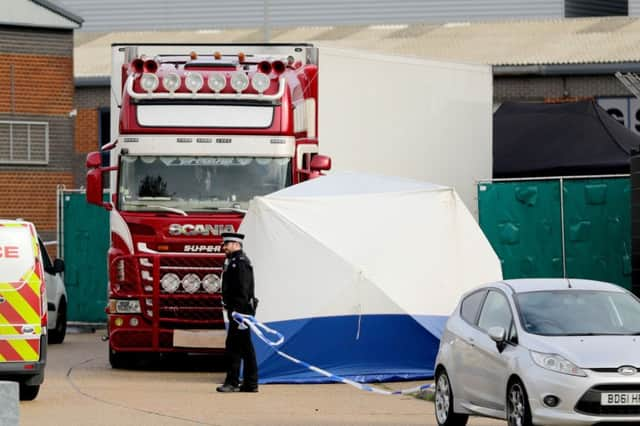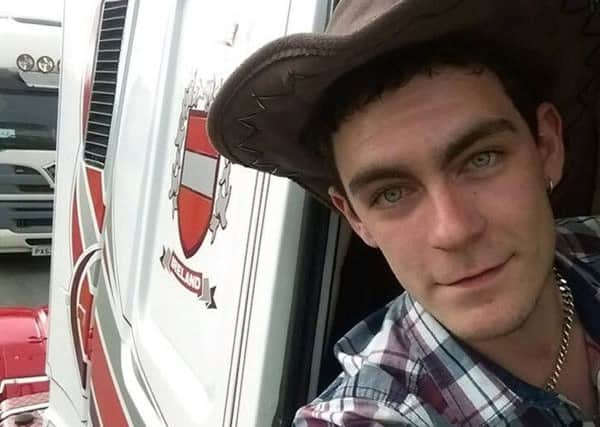Dani Garavelli: Careless talk costs lives when migrants are demonised


And what can you say about a prime minister who declares such tragedies “truly heartbreaking” while deflecting attention away from the policies that create the climate in which they occur? That he is devoid of insight or shame? That when he talks of finding the perpetrators and bringing them to “justice”, he should include those politicians who make it so difficult for migrants they board over-laden dinghies, jump on to the axles of moving vehicles or climb into refrigerated prisons?
Even as he cries his crocodile tears, Boris Johnson is presiding over the break-up of European ties that made the sharing of intelligence and cross-border policing more efficient. He insists such co-operation will continue after Brexit, but until the terms of our departure have been thrashed out, it’s just another promise he’s in no position to make.
Advertisement
Hide AdAdvertisement
Hide AdThe deaths of these migrants is a scandal of unfathomable proportions, its victims the subjects of multiple exploitation. Born into poverty (or having racked up debts), they appear to have been trafficked by other shysters who trade in false promises. Even if they had made it into the UK alive, their dreams would have crashed and burned. They would likely have ended up as slave labour, working as cockle pickers or in the restaurant trade; in a nail bar or a brothel.


Instead, they froze en masse. A text sent by a Vietnamese woman thought to be among the victims captures both the futility of their hopes and the fate that befell them. “I’m sorry Mom. My path to abroad doesn’t succeed. Mom, I love you so much! I’m dying because I can’t breathe,” Pham Thi Tra My wrote.
Most of the migrants would have been like Pham: scared, but determined and with relatives at home waiting for news of their bright new existence. Some of those relatives would have paid thousands of pounds to help their sons and daughters escape, only to realise they had sent them straight into a trap.
Standing opposite Johnson in the House of Commons, Labour leader Jeremy Corbyn said the tragedy was “unbelievable”, which only showed he hadn’t been paying attention. Though grotesque, the deaths were not only believable, but predictable, because a) it is not the first time this has happened and b) experts had warned it would happen again.
In 2000, the bodies of 59 Chinese migrants were found in a lorry in Dover and, in 2004, 23 Chinese migrants drowned when cut off by the tide while cockle-picking on Morecambe Beach.
The investigation into the deaths in 2000 exposed Jing Pin Chen – aka Little Sister – as the leader of a snakehead gang responsible for smuggling 175,000 people. The gang was based in Rotterdam, but had connections in China, Turkey, the Netherlands and the UK . Jing Ping Chen was jailed for three years for her part in the plot, while the Dutch lorry driver, Perry Wacker, was jailed for 14 years for manslaughter.
After the deaths of the cockle pickers, gangmaster Lin Liangren was sentenced to 14 years for criminal negligence motivated, the court said, by greed.
Although investigations into the Purfleet tragedy are continuing, the facts which have emerged seem to point once again to Snakehead gangs and cross-border criminal connections. Human trafficking on an industrial scale.
Advertisement
Hide AdAdvertisement
Hide AdOne of the few commendable things Theresa May did in her time as Home Secretary was to focus on modern slavery. Encouraged by her then special adviser Fiona Hill, she introduced the Modern Slavery Act, tasked MI5 to work with police to track down those who had been trafficked in the UK and gave MI6 and GCHQ extra resources to go after networks abroad.
The positivity of these moves, however, was offset by other less helpful ones happening in parallel.
It was May who came up with the hostile environment policy, which incited a loathing of migrants and led to the Windrush scandal. In any case, after becoming prime minister in 2016, her attention shifted to other things. In the Times on Friday, Hill told how she lobbied for the setting up of a task force, chaired by the prime minister, to encourage joint investigations on human trafficking gangs. But May didn’t turn up for the first meeting and the task force no longer exists.
At roughly the same time, the French authorities decided to close the “jungle” camp at Calais and there was a move to deter migrants from crossing the Channel in small vessels.
The British authorities were warned tighter security at Calais would lead to people smuggling at east coast ports via Belgium. However, even as these prophecies were being fulfilled, a political decision was taken to keep resources focused on Calais and Dover, because they were “more visible to the public”.
It now transpires the problems in Purfleet were visible to anyone who chose to look.
Residents have told of encountering distressed and shoeless individuals and of buses turning up to collect large groups.
While police were turning a blind eye, Johnson and the current Home Secretary, Priti Patel, were gleefully unveiling their new plans on immigration which - surprise, surprise - involve “taking back control” of Britain’s borders and a move to an Australian-based points system.
Advertisement
Hide AdAdvertisement
Hide AdIt’s wilful, this failure to join the dots and understand how one thing feeds into another.
Jailing the gang-masters is right, of course. These criminals build empires out of human misery and deserve everything the law can throw at them. But human misery is omnipresent, the impulse to pursue happiness is deep-rooted and, like drugs, people-trafficking is a multi-million-pound industry. Remove one gang-master and another will take his/her place.
Any journalist who has interviewed refugees or asylum seekers knows crackdowns won’t stop the flow of migrants. Their fear of poverty, religious persecution, torture, is greater than their fear of refrigeration. Just as their fear of being sent back to their home countries is greater than the suffering caused by all the hardships they experience here.
Talk of tightening security may play well with sections of the electorate, but it creates more opportunities for exploitation and heightens the risk of more bodies in lorries.
Stopping acts of desperate recklessness requires greater compassion and less contempt. It requires a recalibration of the way we talk about migrants. So those who climb willingly into death traps aren’t viewed as “infiltrators” or “cargo” or self-seeking foreigners on the make, but ordinary folk like you or me, dreaming ordinary dreams of a life worth living.